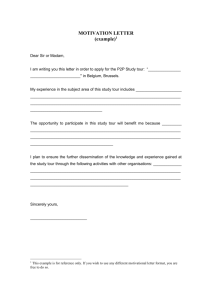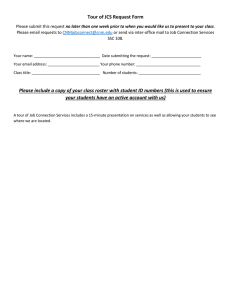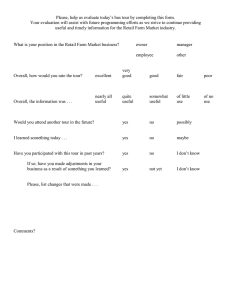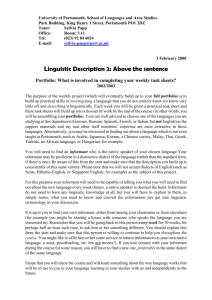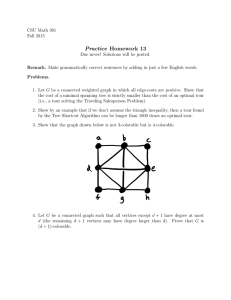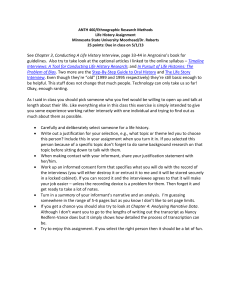EthInterview
advertisement
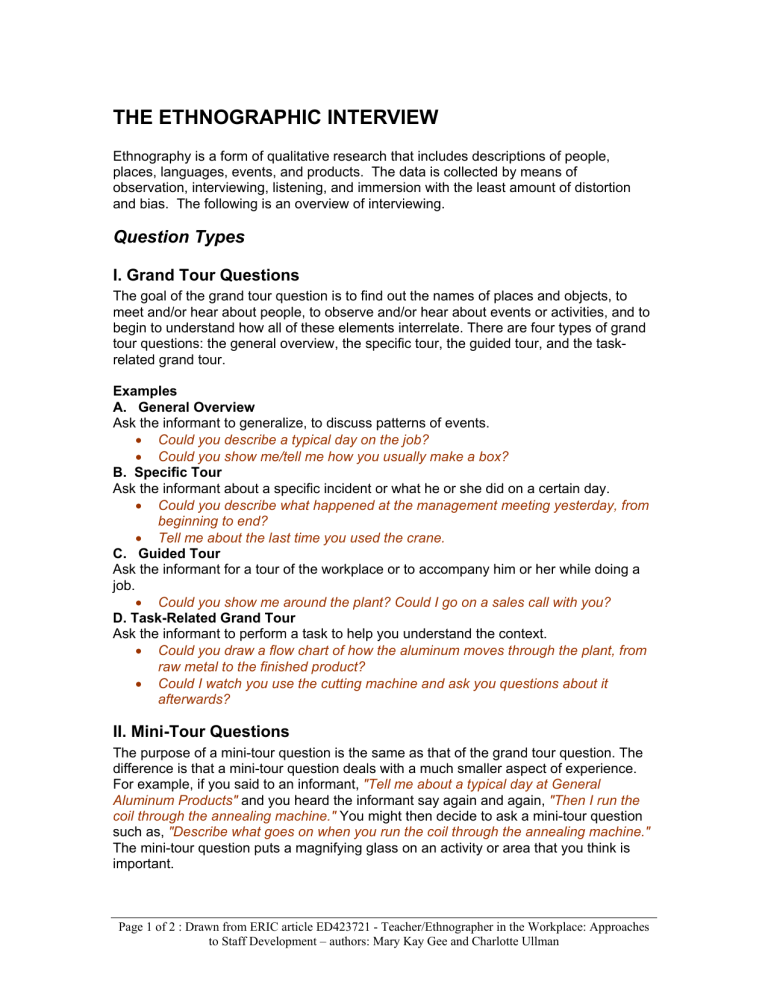
THE ETHNOGRAPHIC INTERVIEW Ethnography is a form of qualitative research that includes descriptions of people, places, languages, events, and products. The data is collected by means of observation, interviewing, listening, and immersion with the least amount of distortion and bias. The following is an overview of interviewing. Question Types I. Grand Tour Questions The goal of the grand tour question is to find out the names of places and objects, to meet and/or hear about people, to observe and/or hear about events or activities, and to begin to understand how all of these elements interrelate. There are four types of grand tour questions: the general overview, the specific tour, the guided tour, and the taskrelated grand tour. Examples A. General Overview Ask the informant to generalize, to discuss patterns of events. • Could you describe a typical day on the job? • Could you show me/tell me how you usually make a box? B. Specific Tour Ask the informant about a specific incident or what he or she did on a certain day. • Could you describe what happened at the management meeting yesterday, from beginning to end? • Tell me about the last time you used the crane. C. Guided Tour Ask the informant for a tour of the workplace or to accompany him or her while doing a job. • Could you show me around the plant? Could I go on a sales call with you? D. Task-Related Grand Tour Ask the informant to perform a task to help you understand the context. • Could you draw a flow chart of how the aluminum moves through the plant, from raw metal to the finished product? • Could I watch you use the cutting machine and ask you questions about it afterwards? II. Mini-Tour Questions The purpose of a mini-tour question is the same as that of the grand tour question. The difference is that a mini-tour question deals with a much smaller aspect of experience. For example, if you said to an informant, "Tell me about a typical day at General Aluminum Products" and you heard the informant say again and again, "Then I run the coil through the annealing machine." You might then decide to ask a mini-tour question such as, "Describe what goes on when you run the coil through the annealing machine." The mini-tour question puts a magnifying glass on an activity or area that you think is important. Page 1 of 2 : Drawn from ERIC article ED423721 - Teacher/Ethnographer in the Workplace: Approaches to Staff Development – authors: Mary Kay Gee and Charlotte Ullman III. Example Questions Example questions are usually woven throughout the ethnographic interview. An informant might say, "My supervisor gave me a hard time about OSHA regulations yesterday," and you might ask, "Can you give me an example of your supervisor giving you a hard time?" It is easy to assume that we share the same idea of what a hard time is, but surprising differences exist. IV. Experience Questions Open-ended experience questions, such as "Could you tell me about some experiences you've had working on the annealing machine?" are often used after a number of grand tour and mini-tour questions. Experience questions are sometimes difficult for people to answer. They often prompt informants to tell about their unusual experiences, as opposed to the more typical experiences. V. Native-Language Questions If your informant is a non-native speaker of English, you speak that language, and it's appropriate to conduct the interview in this language, by all means, do so. However, what is meant by native-language questions here is more about using the terms that the informant uses to talk about the job. For example, if hot aluminum coils arc cooled in a pressurized air containment cooling unit that your informant calls "the blower room," call it the blower room. Ask questions such as, "How long does it stay in the blower room?” The more you can get informants to talk about work the way they think about work, the better. This will give you a window into how they think about things, as well as how they talk about things, and will help establish rapport. There are three types of nativelanguage questions: direct-language questions, hypothetical-interaction questions, and typical-sentence questions. A. Direct-Language Questions Ask the informant how he or she would say something. • What do you call it when you mis-measure a piece? How do you refer to your work area? B. Hypothetical-Interaction Questions Set a scene for the informant. Describe the people involved (talking with a supervisor about a production problem) and try to get him or her to talk the way they would in that situation. • If you were talking with a co-worker, would you say it that way? • If I were on the factory floor, what kind of things would I hear co-workers saying to each other? • How would you say that to your supervisor? C. Typical-Sentence Questions Ask directly for typical sentences or activities. • What are some sentences that use the words “blower room”? Page 2 of 2 : Drawn from ERIC article ED423721 - Teacher/Ethnographer in the Workplace: Approaches to Staff Development – authors: Mary Kay Gee and Charlotte Ullman
